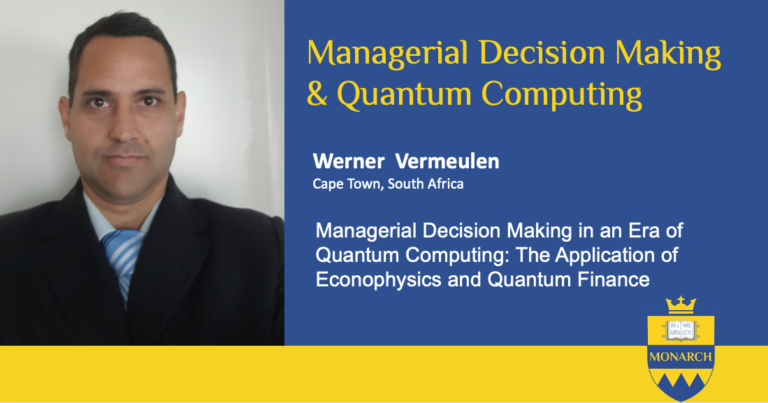Managerial Decision-Making in an Era of Quantum Computing: The Application of Econophysics and Quantum Finance

Monarch is happy to announce the recently authorised research proposal by PhD in Finance Candidate, Mr. Werner Vermeulen, addressing the challenge of improving managerial decision making through the use of Quantum Computing in the area of Econophysics and Quantum Finance.
Research
Strategic managerial decision-making in a new era of quantum computing (“QC”) and Artificial Intelligence (“AI”) may become pivotal to the competitive edge of interconnected corporate success (Cavers, 2017; El Karoui, 2022; Klioutchnikov, 2017; Orrell, 2020). In recent years, traditional computing methods, driven by Moore’s Law and inundated with vast amounts of big data, have exhibited limitations in accurately predicting financial outcomes, particularly during periods of economic crises. Maverick (2024) indicates in Investopedia that the derivatives market is often estimated at over USD 1 quadrillion, and Investment Banks have allocated Billions of USD in derivatives market products alone. Therefore, QCs are being used by expert guided teams from some of the largest technology corporations and Investment Banks around the globe to solve some of corporate finance’s toughest problems (Orrell & Wilmott, 2021; Baaquie, 2023).
Consequently, researchers have redirected their focus from classical physics-based models, including Artificial Intelligence (“AI”) and Machine Learning (“ML”), to the modern science paradigm of quantum mechanics (“QM”) and quantum computing (“QC”), encompassing quantum AI (“QAI”) and quantum ML (“QML”) applications in economics and finance (Orrell, 2020b; Jacquier, et al., 2022). Drawing inspiration from disciplines such as econophysics and Quantum Finance (“QF”), this shift facilitates the development of more resilient financial models capable of computation speeds and scales unattainable with conventional methods. Consequently, enhanced financial modeling fosters improved managerial decision-making and facilitates more precise risk assessment for strategic financial planning purposes.
Therefore, in a complex financial engineering context for business decision-making, the focus of the contemplated research is on high-frequency trading, portfolio optimisation, and risk management for better managerial decision-making with the aid from international quantum computing (“QC”) technologies including AI and quantum financial economics. Furthermore, the contemplated research use a mixed methodological approach (Bryman, A. 2006; Creswell J, 2017; Moustakas, 1994) in investigating the characteristics of a new conceptual model that uses quantum finance principles and quantum computing for better decision-making with respect to high-frequency trading, portfolio optimisation, and risks management (Orrell, 2020b; Jacquier, Kondratyev, Lipton, Lopez de Prado, 2022).
The Researcher
 Mr. Werner Vermeulen is a Professional PhD in Finance Candidate. He is an experienced senior level Financial Engineer within the international asset management industry, with a demonstrated history of research, collaboration and working in writing code, building products and product features, design and implement software, to make big data-driven decisions to ensure effective outcomes. He holds a US Masters of Science in Financial Engineering from WorldQuant University in the USA as well as a Post-Graduate Certificate from the Edinburg Business School. He also holds a Bachelor of Commerce from the University of South Africa. Professionally, Mr. Vermeulen holds the position of Financial Engineer at QuantConnect. Previously, he held the position of Financial Engineer at WorldQuant. He is a Chartered Financial Data Professional and a member of the International Wealth Management, Chartered Institute of Securities and Investment.
Mr. Werner Vermeulen is a Professional PhD in Finance Candidate. He is an experienced senior level Financial Engineer within the international asset management industry, with a demonstrated history of research, collaboration and working in writing code, building products and product features, design and implement software, to make big data-driven decisions to ensure effective outcomes. He holds a US Masters of Science in Financial Engineering from WorldQuant University in the USA as well as a Post-Graduate Certificate from the Edinburg Business School. He also holds a Bachelor of Commerce from the University of South Africa. Professionally, Mr. Vermeulen holds the position of Financial Engineer at QuantConnect. Previously, he held the position of Financial Engineer at WorldQuant. He is a Chartered Financial Data Professional and a member of the International Wealth Management, Chartered Institute of Securities and Investment.
